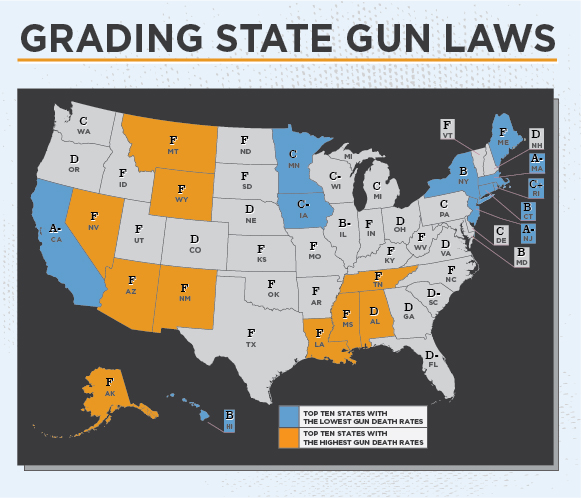Strictest Gun Laws by State

What are the strictest gun laws by state?
Top 5 States with the Strictest Gun Laws
1. California
2. New Jersey
3. Massachusetts
4. New York
5. Connecticut
California
California has some of the strictest gun laws in the country, including a ban on assault weapons and large capacity magazines. In addition, gun owners in California must obtain a permit to purchase a handgun and must pass a background check. The state also has a waiting period of 10 days for all firearm purchases.
New Jersey
New Jersey has a number of gun control measures in place, including a ban on assault weapons and high-capacity magazines. In addition, gun owners in New Jersey must obtain a permit to purchase a handgun and must complete a firearms safety training course. The state also has a waiting period of at least three days for all firearm purchases.
Massachusetts
Massachusetts has some of the strictest gun laws in the country, including a ban on assault weapons and large capacity magazines. In addition, gun owners in Massachusetts must obtain a license to carry a firearm and must pass a background check. The state also has a waiting period of at least three days for all firearm purchases.
New York
New York has a number of gun control measures in place, including a ban on assault weapons and high-capacity magazines. In addition, gun owners in New York must obtain a permit to purchase a handgun and must pass a background check. The state also has a waiting period of at least three days for all firearm purchases.
Connecticut
Connecticut has some of the strictest gun laws in the country, including a ban on assault weapons and large capacity magazines. In addition, gun owners in Connecticut must obtain a permit to purchase a handgun and must pass a background check. The state also has a waiting period of at least two weeks for all firearm purchases.
What are the advantages of strict gun laws?
Strict gun laws can help reduce gun violence and prevent mass shootings. By making it more difficult for individuals to obtain firearms, it can help keep guns out of the hands of those who shouldn't have them. In addition, background checks and waiting periods can help ensure that those who do obtain firearms are responsible gun owners.
What are the disadvantages of strict gun laws?
Some argue that strict gun laws infringe upon their Second Amendment rights and that they do little to prevent gun violence. Others argue that criminals will still be able to obtain firearms through illegal means, making it difficult for law-abiding citizens to defend themselves.
Conclusion
While there are differing opinions on the effectiveness of strict gun laws, it is clear that some states have implemented more restrictive laws in an effort to reduce gun violence. Whether or not these laws are effective remains to be seen, but it is clear that the issue of gun control will continue to be a contentious issue in the United States.
FAQ
1. What is an assault weapon?
An assault weapon is a semi-automatic firearm that has the ability to accept a detachable magazine and has one or more of the following features: a pistol grip, a folding or telescoping stock, a flash suppressor, or a bayonet mount.
2. What is a waiting period?
A waiting period is a specified amount of time between the purchase of a firearm and when the buyer can take possession of it. This waiting period is intended to give law enforcement officials time to conduct a background check on the buyer.
3. What is a background check?
A background check is a process that is used to determine whether a person is eligible to purchase a firearm. This process typically involves a review of criminal records, mental health records, and other information that may disqualify the individual from owning a firearm.
4. Do strict gun laws violate the Second Amendment?
There is ongoing debate about whether or not strict gun laws violate the Second Amendment. While the Supreme Court has upheld the right of individuals to own firearms, it has also acknowledged that the government has the right to regulate firearms in the interest of public safety.
